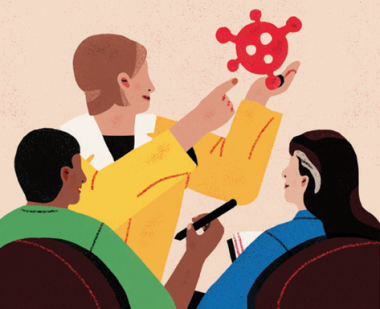
Funded by a Grand Challenges Impact Award from the University of Maryland, the Pandemic Readiness Initiative (PRI) aims to learn from COVID-19 and other disasters to better understand human behavior in public health emergencies and prepare for future crises. It integrates a broad array of social and behavioral sciences, including public health and risk communication, social media and other digital technologies, health literacy, health equity, public opinion, cognitive processing of messages, disaster management and cultural studies.
PRI is one of 11 projects involving College of Education faculty that were funded by Grand Challenges Grants earlier this year. In all, the university awarded more than $30 million to 50 projects addressing pressing societal issues, including educational disparities, social injustice, climate change, global health and threats to democracy. The Grand Challenges Grants Program is the largest and most comprehensive program of its type in the university’s history.
Cynthia Baur of the UMD School of Public Health and Brooke Fisher Liu of the College of Arts and Humanities lead PRI, which includes colleagues from the College of Education, College of Behavioral and Social Sciences, Philip Merrill College of Journalism, College of Information Studies, School of Public Health and College of Arts and Humanities.
Sarah McGrew, assistant professor in the College of Education, is a team member working on PRI. McGrew discusses her role in the project and the role of education in helping to prepare for future pandemics.

How will PRI help society be ready for the next pandemic?
PRI is focused on the social and behavioral aspects of preparing for the next pandemic. We’re thinking about how we can help society respond more productively and equitably.
How will you bring your expertise to PRI?
I study how people learn to evaluate information online. Online information was hugely important to how many of us understood and made decisions about the COVID-19 pandemic--and that will continue to be true during future health threats. One piece of this initiative is about how we create effective messaging for people about pandemic-related health risks and decisions, including how we help people evaluate information and make choices about what to trust.
Why is it important to have an education perspective to address this grand challenge?
We can think of information from a supply perspective and a demand perspective. Communication researchers often think about the supply side, such as how we can make sure that the government, universities and community organizations are putting out effective messages that will reach people where they are and feel trustworthy to them. But of course, there’s also the demand side, which looks at things like: How are people looking for information? How are they interpreting the information they see, deciding what to trust and then making decisions based on the information? Education focuses on the demand side. We need expertise in how people learn and how people reason about and process information. Education researchers have a lot of expertise in those areas, and so we have a big role to play.
Why does this issue matter to you personally?
Personally and professionally, I spend a lot of time trying to convince people that access to high-quality information matters. During the height of the COVID-19 pandemic, people were making potentially life-altering decisions based on the information available to them, like whether to wear a mask or get vaccinated. The pandemic exposed so many equity issues, for example, whether communities had access to high-quality information and skills that would help them effectively evaluate that information. That’s something we can do a better job tackling in the future.



